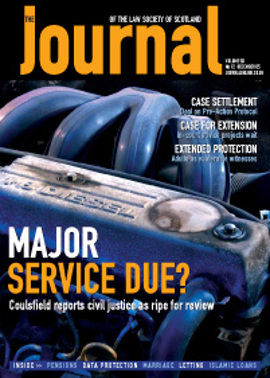Farewell then common law marriage

In a surprise move, the Scottish Executive has announced the impending abolition of marriage by cohabitation with habit and repute (“MCHR”). Not before time, “common law marriage” is to be a thing of the past.
Irregular marriage was abolished in England and Wales by Lord Hardwicke’s Act of 1753. Hardwicke acted against the “scandal” of marriage being carried out in informal and boisterous circumstances, but the crucial problem was that young people could marry without parental consent. Scotland resisted Hardwicke’s attempt to end irregular marriage in Scotland in 1755, and so running away to Scotland to get married would become something of a fashion, and a scandal, over the years. Furious red-faced English fathers (and presumably some mothers) pursued their wayward offspring in a race to the Scottish border where marriage could be had over the anvil at Gretna without parental consent.
The role of consent
Irregular marriage has its roots in medieval canon law where the central question was always the consent of the parties. The most straightforward way of marrying was by present consent (marriage de presenti). No publicity, no expense and no interference from your family or community.
The second form was marriage by promise followed by intercourse (promise subsequente copula); surely no respectable woman would have proceeded otherwise? Both of these forms were abolished for the future by the Marriage (Scotland) Act 1939, though it remains possible to seek declarator of marriage where the acts took place prior to 1 July 1940.
The third form, if it is indeed a separate form, is marriage by cohabitation with habit and repute. In pre-tridentine canon law, if a couple lived together and presented themselves as married for an extended period of time, there was a presumption that they had exchanged consent.
The departmental committee set up to consider Scots marriage law in 1936 concluded that MCHR should go along with the “other” forms of irregular marriage. Informal arrangements were too doubtful a basis on which to establish rights to newly introduced welfare benefits, especially widows’ pensions. But Parliament clearly decided that MCHR should stay: what is not at all clear is the basis for its remaining part of Scots law. If, as David Sellar argues (in Carey Miller and Meyers, Comparative and Historical Essays in Scots Law (1992)), MCHR was merely proof of consent, the abolition of marriage de presenti and by promise subsequente copula would mean that MCHR was proof of something that could not, in any event, found marriage. On the other hand, Eric Clive argues (Husband and Wife, paras 05.022-026), in part because MCHR clearly still exists, that it must at some point have become a form of irregular marriage in its own right.
Difficulties in recent cases
What is certain is that the courts have not quibbled over the continuing existence of MCHR, even if they fail to enlighten the rest of us as to what basis it has in law.
Two recent cases highlight the problem with MCHR. The Inner House considered a dispute between a purported widow and the defunct’s executors in Ackerman v Logan’s Executors 2002 SLT 37. Ms Ackerman had lived with Mr Logan for four years until his sudden death in 1998 and gave evidence of a “wedding ring” and a honeymoon. She said that she was introduced to, and was treated by, friends and associates of Mr Logan as his wife. However the Lord Ordinary found that they had merely been engaged to be married and that their reputation as being married fell far short of the general repute that was required. The Inner House found the Lord Ordinary entitled to so conclude.
Is it possible that Mr Logan wanted Ms Ackerman treated as his wife? Might she deserve some element of financial provision? From the case report, these questions might be answered in the affirmative. Had she been formally married her position would be clear. Had she been a “mere” cohabitant her position would be clear. As it was, her status was radically uncertain and the court was obliged either to find Ms Ackerman married and entitled to a large part of the estate or find her unmarried and entitled to nothing at all.
In October’s Journal, long-time critic of MCHR, Kenneth Norrie, discussed the Outer House case of Sheikh v Sheikh 2005 GWD 11-183 under the typically direct title of “Marriage by deception”. For a number of reasons the pursuer refused to marry the defender, but his family was strongly religious and would only accept her if they were married. Lord Philip concluded that they had both successfully deceived the family and were married by CHR: Mrs Sheikh could claim financial provision on divorce.
As Professor Norrie writes, the pursuer “may well have believed herself ‘married’ in a social sense but she knew full well that she was not married in any lawful sense. The repute was the result of deliberate deceit to pull the wool over the eyes of a devout family”.
Abolition at last
Now MCHR is to be abolished. The Executive has submitted an amendment to its own Family Law (Scotland) Bill 2005 which, if enacted, will provide that from a future date to be determined, “the rule of law by which marriage may be constituted by cohabitation with habit and repute shall cease to have effect”.
The amendment was debated and agreed to by the Justice 1 Committee in October, where the main concern seemed to be whether people who had undergone a procedurally defective marriage ceremony in another jurisdiction would be denied a remedy. Depute Justice Minister Hugh Henry told the committee not to worry; of the nine cases raised between January 2003 and June 2005, seven concerned succession rights to a deceased partner’s estate and none involved MCHR being used as a vehicle to remedy defective marriage ceremonies.
So why is MCHR to be abolished now when so many calls for action have gone unheeded? The most obvious reason is that if most cases are to do with finance, whether on separation or death, those deserving of financial provision will soon have a remedy through the Family Law (Scotland) Act itself. The current bill will provide for discretionary awards of financial provision to former cohabitants, thus removing the absolute imperative of establishing a marriage if someone in a deserving case is to receive any financial protection.
But perhaps the real reason lies with cases such as Ackerman and Sheikh. As Norrie and others argue, if a party to a relationship deserves some financial settlement so be it, but it seems it is now a step too far to hold as married those who engage in subterfuge in full knowledge that they are not married, while denying any remedy at all to others who cohabit but whose liberal (or spiteful?) friends do not assume they are married despite their behaviour towards one another.
Marriage by cohabitation with habit and repute creates confusion, with too many people thinking they have rights as “common law spouses” when their chances of establishing a marriage and so gaining protection are negligible. The introduction of financial rights and obligations for cohabitants means that meritorious cases can be dealt with. Abolition is another, albeit belated, move towards a modern system of family law.
Brian Dempsey, Editor, SCOLAG
In this issue
- Holes in Scotland's corporate killing proposals
- A month of contrasts
- Too small to be flexible?
- Engine overhaul
- Vital voices revisited
- Letting in the law
- Puzzles and paradoxes
- Legacy giving in a Scottish climate
- New deal for PI claims
- Data protection crackdown: do you comply?
- In real terms
- Access route
- Better law-making: just lip service?
- Appealing prospects
- The limits of diversification
- Cashing in on the event
- Farewell then common law marriage
- Scottish Solicitors Discipline Tribunal
- Website reviews
- Book reviews
- Unveiling the Islamic mortgage






